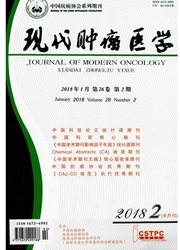

 中文摘要:
中文摘要:
目的:研究非小细胞肺癌中MTA1蛋白表达及临床意义。方法:采用免疫组织化学法检测96例非小细胞肺癌组织MTA1蛋白表达情况,并探讨其与非小细胞肺癌临床病理因素的关系。结果:MTA1蛋白在非小细胞肺癌组织中的表达明显高于癌旁正常肺组织(P〈0.05),其表达与患者年龄、性别、病理组织学分型及肿瘤大小无明显相关性(P〉0.05)。MTA1的表达水平与淋巴结转移及TNM分期相关,在有淋巴结转移的病例中的表达(阳性率为75.6%)显著高于无淋巴结转移的病例(阳性率为54.5%),在Ⅲ和Ⅳ期病例中的表达(阳性率为76.3%)显著高于Ⅰ和Ⅱ期(阳性率为55.2%)(P〈0.05)。结论:MTA1表达水平与患者的TNM分期密切相关,在非小细胞肺癌进展包括淋巴结转移的过程中起到重要作用,可能成为潜在的治疗靶点。
 英文摘要:
英文摘要:
Objective:To investigate the expression of MTA1 in non-small cell lung cancer(NSCLC) and the association between it and clinicopathological characters of NSCLC.Methods:MTA1 expression was examined in 96 cases of NSCLC using immunohistochemistry.Results:MTA1 expression in primary NSCLC tissues was higher than that in adjacent normal lung tissues(P0.05).There was no relationship between MTA1 expression and age,gender,histological type and tumor size(P0.05).MTA1 expression was significantly correlated with lymph node metastasis and advanced TNM stage(P0.05).Conclusion:MTA1 expression in NSCLC was associated with TNM stage and may play important roles in NSCLC development and lymph node metastasis.It may become a potential target of clinical therapy.
 同期刊论文项目
同期刊论文项目
 同项目期刊论文
同项目期刊论文
 期刊信息
期刊信息
